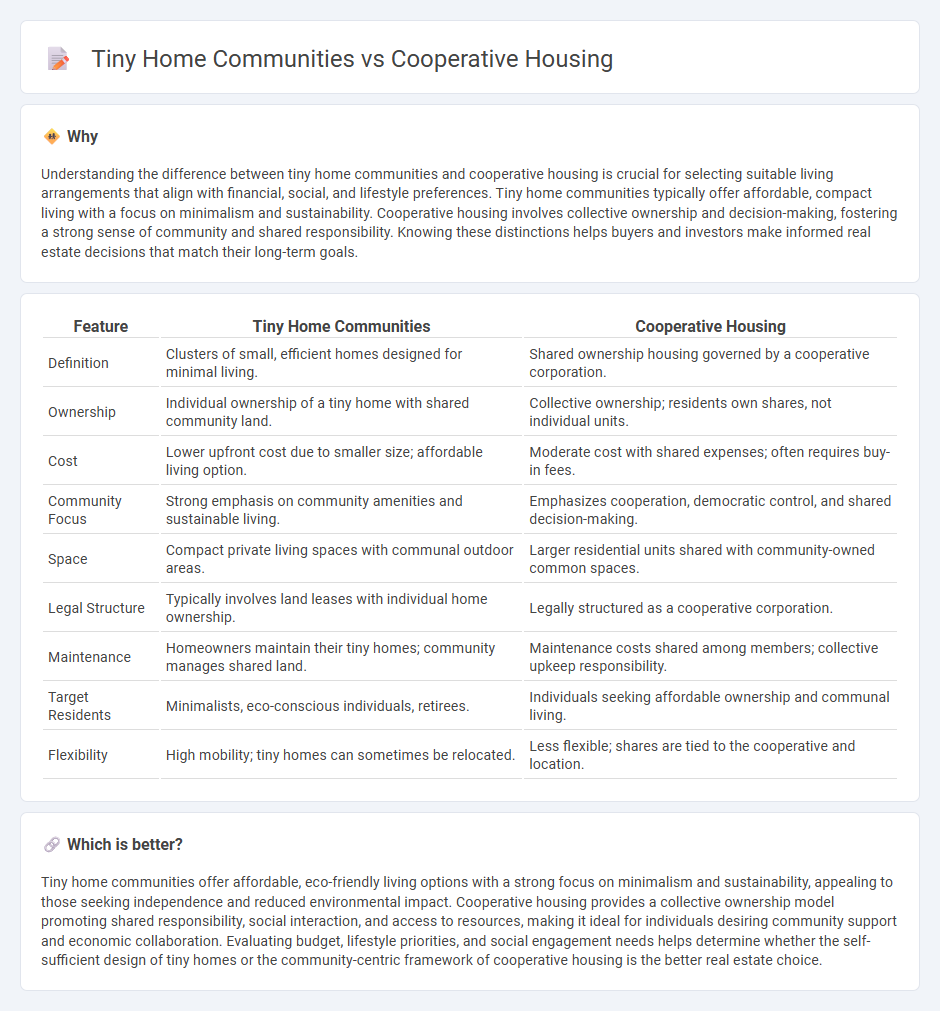
Tiny home communities offer compact, affordable living spaces focused on minimalism and sustainability, attracting individuals seeking financial freedom and simplified lifestyles. Cooperative housing fosters shared ownership and collective decision-making, creating strong community bonds and reducing living costs through collaboration. Explore the benefits and differences between these innovative housing models to find the ideal fit for your lifestyle.
Why it is important
Understanding the difference between tiny home communities and cooperative housing is crucial for selecting suitable living arrangements that align with financial, social, and lifestyle preferences. Tiny home communities typically offer affordable, compact living with a focus on minimalism and sustainability. Cooperative housing involves collective ownership and decision-making, fostering a strong sense of community and shared responsibility. Knowing these distinctions helps buyers and investors make informed real estate decisions that match their long-term goals.
Comparison Table
| Feature | Tiny Home Communities | Cooperative Housing |
|---|---|---|
| Definition | Clusters of small, efficient homes designed for minimal living. | Shared ownership housing governed by a cooperative corporation. |
| Ownership | Individual ownership of a tiny home with shared community land. | Collective ownership; residents own shares, not individual units. |
| Cost | Lower upfront cost due to smaller size; affordable living option. | Moderate cost with shared expenses; often requires buy-in fees. |
| Community Focus | Strong emphasis on community amenities and sustainable living. | Emphasizes cooperation, democratic control, and shared decision-making. |
| Space | Compact private living spaces with communal outdoor areas. | Larger residential units shared with community-owned common spaces. |
| Legal Structure | Typically involves land leases with individual home ownership. | Legally structured as a cooperative corporation. |
| Maintenance | Homeowners maintain their tiny homes; community manages shared land. | Maintenance costs shared among members; collective upkeep responsibility. |
| Target Residents | Minimalists, eco-conscious individuals, retirees. | Individuals seeking affordable ownership and communal living. |
| Flexibility | High mobility; tiny homes can sometimes be relocated. | Less flexible; shares are tied to the cooperative and location. |
Which is better?
Tiny home communities offer affordable, eco-friendly living options with a strong focus on minimalism and sustainability, appealing to those seeking independence and reduced environmental impact. Cooperative housing provides a collective ownership model promoting shared responsibility, social interaction, and access to resources, making it ideal for individuals desiring community support and economic collaboration. Evaluating budget, lifestyle priorities, and social engagement needs helps determine whether the self-sufficient design of tiny homes or the community-centric framework of cooperative housing is the better real estate choice.
Connection
Tiny home communities and cooperative housing share a common goal of promoting affordable, sustainable living through shared resources and community engagement. Both models emphasize collective ownership or governance, reducing individual costs and environmental impact while fostering strong social networks. These housing innovations address urban affordability crises by optimizing limited space and encouraging cooperative decision-making among residents.
Key Terms
Ownership Structure
Cooperative housing operates on a model where residents collectively own shares in the corporation that owns the property, granting each member usage rights rather than individual property titles. Tiny home communities typically involve individual ownership or long-term leases of standalone tiny homes, allowing more personal title control but often less communal decision-making. Explore the nuances of these ownership structures to determine which housing model aligns with your lifestyle and investment goals.
Community Governance
Cooperative housing emphasizes collective ownership and democratic decision-making where each member has an equal vote in governance, fostering strong community involvement and shared responsibilities. Tiny home communities often implement flexible governance models that balance individual autonomy with communal rules tailored to the smaller scale and diverse resident needs. Explore more to understand how community governance shapes sustainable living environments in these housing models.
Affordability
Cooperative housing offers shared ownership and collective cost management that significantly reduces individual financial burdens, making it an affordable option for many families. Tiny home communities capitalize on minimalistic living, lowering construction and maintenance expenses to create budget-friendly housing solutions. Explore the detailed comparison to understand which model best suits your affordability needs.
Source and External Links
Housing cooperative - Wikipedia - A housing cooperative (or housing co-op) is a legal entity owning residential buildings, with members holding shares that grant the right to occupy units, emphasizing pooled resources and democratic member control distinct from traditional home ownership models.
Housing Co-ops - Cooperatives for a Better World - Housing co-ops empower residents through collective ownership and decision-making, offering an affordable, financially stable alternative to renting or condos, where members share responsibility and benefit the local community.
What is a co-op and how do they work? | Rocket Mortgage - Cooperative housing (co-ops) involves buying shares in a nonprofit corporation that owns a building, giving members shared ownership and control rather than individual property titles, making it a unique alternative to condos or traditional home buying.
 dowidth.com
dowidth.com